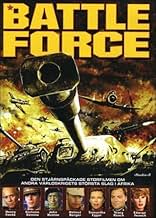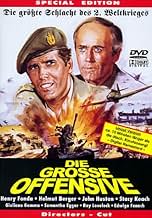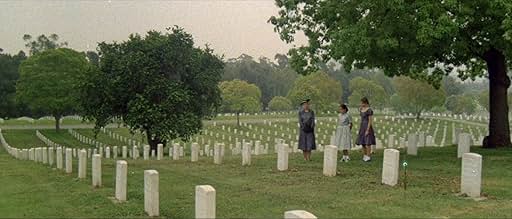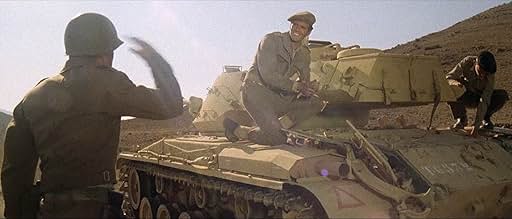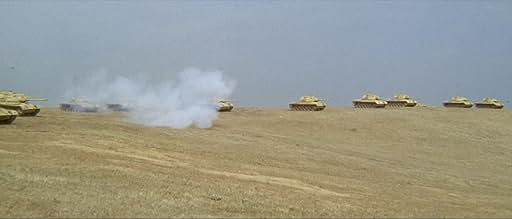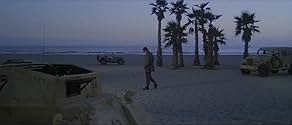IMDb RATING
4.7/10
630
YOUR RATING
How World War II affected the lives of a German family and an American family, both of whom had sons and fathers fighting in the war.How World War II affected the lives of a German family and an American family, both of whom had sons and fathers fighting in the war.How World War II affected the lives of a German family and an American family, both of whom had sons and fathers fighting in the war.
Ida Galli
- Sybil Scott
- (as Evelyn Stewart)
Rik Battaglia
- French Partisan
- (as Rick Battaglia)
Featured reviews
Director Umberto Lenzi's movies have always been the subject of criticism on web boards and even from nationally known reviewers, including Leonard Maltin. It seems as though he takes a lot of flak simply because his films are made overseas. At its heart, "The Greatest Battle" is really no better or worse than the slew of epic war films to come out of Hollywood in the 1970s.
During the Berlin Olympics of 1936, German Major Roland (Stacy Keach); American General Foster (Henry Fonda); reporter Sean O'Hara (John Huston) and Jewish actress Annelise Ackerman (Samantha Eggar) meet and become friends. Flash forward to late 1941: America is embroiled in World War II. Several more characters are introduced, namely: Foster's loser son, John (Ray Lovelock); gutsy British commando leader Captain Scott (Giuliano Gemma) and dedicated Nazi commando officer Lt. Zimmer (Helmut Berger). All of these characters become interconnected over the course of the next two years and wind up coming face-to-face at the Battle of the Mareth Line in North Africa. Each turn in a dedicated, honest performance something to be admired in this genre.
Several familiar European actors appear in the supporting cast, and although their parts are unimportant to the storyline, it's essential to mention some of them: Giacomo Rossi-Stuart ("Hornets' Nest") plays John Foster's commander; Andrea Bosic ("Hell's Brigade") as the leader of Greek partisans; Ida Galli ("Eagles Over London") as Scott's estranged wife, and Venantino Venantini ("The War Devils") as her new husband; Geoffrey Copleston ("The Assisi Underground") as a menacing SS Colonel; Luciano Catenacci ("The Battle of El Alamein") as a British radio operator; the list goes on forever. Even Orson Welles ("The Battle of Neretva") narrates the proceedings rather unnecessarily and, often, incorrectly.
For the most part, this is a plot less series of scenes, chronicling major events in the characters' lives and campaigns. Lenzi fills out the running time with stylistic action sequences and well-integrated stock footage. Lenzi's directorial style and energy are apparent in a number of battle scenes. He takes a lot of ideas and scenarios from his earlier war films notably, "Battle of the Commandos" (a partisan ambush of a German armored convoy looks awfully familiar, as does a commando raid on a coastal bunker) and shoots them with a bigger budget and more professionalism. The Federico Zanni photography is simply dazzling and excellently edited by Eugenio Alabiso, one of my favorite genre-editors.
Unfortunately, a lot of familiar stock footage from "Battle of the Commandos", "Commandos", "Desert Assault" and "The Battle of El Alamein" is used as a substitute for original action footage, which really hampers the original, epic feel of the movie. But look at Hollywood's epic "Midway" released in 1976: it's a hodgepodge of stock footage and cameos, yet is much better received by audiences than this film. The major action sequences revolve solely around the stock footage, but that's okay in this movie, because the material surrounding these sequences is so good.
The production values are amazingly high in this film, setting it another notch among its' peers. The sets, from Parisian bars and brothels, to huge entrenchments, fuel dumps and railroad stations look fantastic. The costumes and props are appropriate, too. There are hundreds of extras, tanks, APCs, jeeps and airplanes dotting the screen, giving the film the appropriate epic look.
This Italian-produced war epic is typically underrated and undeserving of the criticism it so often receives. While it does lack a storyline and has no character development whatsoever and contains reels of stock footage, the original material, style and slew of actors help to offset these flaws. "The Greatest Battle" is no better or worse than any similar film made in Hollywood, and is certainly much more entertaining and engaging than titles like "Midway".
During the Berlin Olympics of 1936, German Major Roland (Stacy Keach); American General Foster (Henry Fonda); reporter Sean O'Hara (John Huston) and Jewish actress Annelise Ackerman (Samantha Eggar) meet and become friends. Flash forward to late 1941: America is embroiled in World War II. Several more characters are introduced, namely: Foster's loser son, John (Ray Lovelock); gutsy British commando leader Captain Scott (Giuliano Gemma) and dedicated Nazi commando officer Lt. Zimmer (Helmut Berger). All of these characters become interconnected over the course of the next two years and wind up coming face-to-face at the Battle of the Mareth Line in North Africa. Each turn in a dedicated, honest performance something to be admired in this genre.
Several familiar European actors appear in the supporting cast, and although their parts are unimportant to the storyline, it's essential to mention some of them: Giacomo Rossi-Stuart ("Hornets' Nest") plays John Foster's commander; Andrea Bosic ("Hell's Brigade") as the leader of Greek partisans; Ida Galli ("Eagles Over London") as Scott's estranged wife, and Venantino Venantini ("The War Devils") as her new husband; Geoffrey Copleston ("The Assisi Underground") as a menacing SS Colonel; Luciano Catenacci ("The Battle of El Alamein") as a British radio operator; the list goes on forever. Even Orson Welles ("The Battle of Neretva") narrates the proceedings rather unnecessarily and, often, incorrectly.
For the most part, this is a plot less series of scenes, chronicling major events in the characters' lives and campaigns. Lenzi fills out the running time with stylistic action sequences and well-integrated stock footage. Lenzi's directorial style and energy are apparent in a number of battle scenes. He takes a lot of ideas and scenarios from his earlier war films notably, "Battle of the Commandos" (a partisan ambush of a German armored convoy looks awfully familiar, as does a commando raid on a coastal bunker) and shoots them with a bigger budget and more professionalism. The Federico Zanni photography is simply dazzling and excellently edited by Eugenio Alabiso, one of my favorite genre-editors.
Unfortunately, a lot of familiar stock footage from "Battle of the Commandos", "Commandos", "Desert Assault" and "The Battle of El Alamein" is used as a substitute for original action footage, which really hampers the original, epic feel of the movie. But look at Hollywood's epic "Midway" released in 1976: it's a hodgepodge of stock footage and cameos, yet is much better received by audiences than this film. The major action sequences revolve solely around the stock footage, but that's okay in this movie, because the material surrounding these sequences is so good.
The production values are amazingly high in this film, setting it another notch among its' peers. The sets, from Parisian bars and brothels, to huge entrenchments, fuel dumps and railroad stations look fantastic. The costumes and props are appropriate, too. There are hundreds of extras, tanks, APCs, jeeps and airplanes dotting the screen, giving the film the appropriate epic look.
This Italian-produced war epic is typically underrated and undeserving of the criticism it so often receives. While it does lack a storyline and has no character development whatsoever and contains reels of stock footage, the original material, style and slew of actors help to offset these flaws. "The Greatest Battle" is no better or worse than any similar film made in Hollywood, and is certainly much more entertaining and engaging than titles like "Midway".
This spectacular movie starts in Berlin during Oympic Games 1936 with the African-American Jesse Owens as champion . There reunites a Nazi officer (Stacy Keach) , a veteran American journalist (John Huston), a famous actress (Samantha Eggar) and an US General (Henry Fonda). Keach gives gifts to the hosts captioning : 'In God we trust' . The group of different nationalities vows to meet five years later but WWII interrupts their lives . Los Angeles 1942 , the upright General incarnated by Henry Fonda is assigned to West Point Academy and his son (Ray Lovelock) takes the ranks to North African campaign . After the action is placed on several locations , as London , West Point, Le Hauvre (France) . Island of Creta , October 1942, an official (Giuliano Gemma) whose mission is to destroy a German installation before being used against the Allied forces . Following the feats about Partisans and a parachuted squadron (led by Giacomo Rossi Stuart) attacking a train (commanded by Helmut Berger) transporting a big German-built cannon (whose scenes are taken from ¨Battle of commands¨). Meanwhile the German actress (Samantha Eggar)for the reason his Jewish origin is detained by SS and Nazi official Berger is enamored to prostitute (gorgeous Edwige Fenech) . Posteriorly , it tells battles in Mareth line March 14, 1943 and Gabes , North Africa , engaging war German Army against British VIII army . There a captain (Gemma) neutralizes a bomb camp and Nazi officer (Berger) impersonates Allied soldier to destroy supplies . Taking place spectacular battles with miniaturized tanks (whose footage is taken from ¨Battle of Alaimen¨ by Giorgo Ferroni and the same producer Mino Loy) .
This is a regularly conceived WWII with action filled , studio character , drama and exciting battles , but nothing special . Packs inaccurate details and an extremely talented though wasted cast make this one of all-time great Italian epic productions though failed . The film contains news-reel documentary , stock-shots vignettes and miniatures , however lost continuity with several cuts and zooms . The battle scenes were shot in desert of Tabernas (Almeria) where in the 60s and 70s were filmed lots of Westerns . Furthermome, a prestigious cast , as Fonda , Eggar , Keach and appears as narrator the great Orson Welles . Numerous Italian secondaries as Jack Stuart , Andrea Bosic , Venantino Venanti , Ken Wood , Ida Valli and Rick Battaglia habitual of Peplum and Spaghetti . The tale was middlingly directed by Umberto Lenzi , he often used the pseudonym Hank Milestone and Humphrey Logan . He's an expert on wartime genre such as he proved in ¨ Desert commandos¨ , ¨Battle of commandos¨, ¨From hell to victory¨, and ¨Bridge to hell¨.
This is a regularly conceived WWII with action filled , studio character , drama and exciting battles , but nothing special . Packs inaccurate details and an extremely talented though wasted cast make this one of all-time great Italian epic productions though failed . The film contains news-reel documentary , stock-shots vignettes and miniatures , however lost continuity with several cuts and zooms . The battle scenes were shot in desert of Tabernas (Almeria) where in the 60s and 70s were filmed lots of Westerns . Furthermome, a prestigious cast , as Fonda , Eggar , Keach and appears as narrator the great Orson Welles . Numerous Italian secondaries as Jack Stuart , Andrea Bosic , Venantino Venanti , Ken Wood , Ida Valli and Rick Battaglia habitual of Peplum and Spaghetti . The tale was middlingly directed by Umberto Lenzi , he often used the pseudonym Hank Milestone and Humphrey Logan . He's an expert on wartime genre such as he proved in ¨ Desert commandos¨ , ¨Battle of commandos¨, ¨From hell to victory¨, and ¨Bridge to hell¨.
I'm not a fan of war films to say the least and if I'm going to sit down and watch one, there generally has to be a real good reason for doing so. Despite the fact that Battle Force is a largely unknown and inconsequential war film from the late seventies; I actually did have several good reasons for seeing it. Anything directed by Umberto Lenzi is automatically worth watching considering all the great cult films he has delivered; from some of the best Giallo's to the very best of the Polizi genre, and adding to that is absolutely mouth-watering cast. However, in spite of those things; this is still a highly disappointing and really rather rubbish movie. The plot is rather confusing and doesn't make much sense and mainly focuses on two families of different nationalities during World War Two. However, we also focus on the actual war itself and various battles that the characters are involved in and this all gets mingled in with the stories of the families...
The main problem with this film is that it tries to do too much and the one hundred minute running time is simply not long enough for it to do it all in (although I am thankful that the film didn't last for longer!). I don't really know how credible Umberto Lenzi was as a director in 1978 (probably more credible than he was in the eighties), but somehow he has managed to get his hands on a magnificent cast chequered with stars - and not just cult stars! Big names such as John Huston, Henry Fonda and Orson Welles have roles alongside cult stars such as Ray Lovelock, Samantha Eggar, Evelyn Stewart, Stacy Keach, Helmut Berger and Edwige Fenech (who really doesn't appear for long enough). This cast is all well and good but unfortunately it's wasted. The plot lacks any sort of direction and the film might actually have been better as an anthology style movie with a few different but focused stories. The war scenes look extremely cheap (the budget was probably spent on paying stars' wages) and that also brings the film down, although there is plenty of action. Overall, this did actually have the potential to be a masterpiece; but to say the least, it isn't! Recommended for its cult value only.
The main problem with this film is that it tries to do too much and the one hundred minute running time is simply not long enough for it to do it all in (although I am thankful that the film didn't last for longer!). I don't really know how credible Umberto Lenzi was as a director in 1978 (probably more credible than he was in the eighties), but somehow he has managed to get his hands on a magnificent cast chequered with stars - and not just cult stars! Big names such as John Huston, Henry Fonda and Orson Welles have roles alongside cult stars such as Ray Lovelock, Samantha Eggar, Evelyn Stewart, Stacy Keach, Helmut Berger and Edwige Fenech (who really doesn't appear for long enough). This cast is all well and good but unfortunately it's wasted. The plot lacks any sort of direction and the film might actually have been better as an anthology style movie with a few different but focused stories. The war scenes look extremely cheap (the budget was probably spent on paying stars' wages) and that also brings the film down, although there is plenty of action. Overall, this did actually have the potential to be a masterpiece; but to say the least, it isn't! Recommended for its cult value only.
The Biggest Battle (1978)
* 1/2 (out of 4)
Incredibly disappointing drama starts off in Germany during the 1936 Olympics where an American general (Henry Fonda), a German major (Stacy Keach), a Jewish actress (Samantha Eggar) and a war correspondent (John Huston) are having dinner and agreeing that Hitler will not cause a war. Flash forward to 1942 and war is happening and all sides of this dinner are now in the middle.
THE BIGGEST BATTLE is an Italian and West German co-production that was meant to rival various American movies that took on the WWII subject. Of course something like MIDWAY was an obvious inspiration. The most interesting thing about this film is that it did have a bigger budget than you'd normally see in a film like this but the problem is that the budget wasn't big enough. It's clear that writer-director Umberto Lenzi wanted to make an epic war film and even got a terrific cast together but the film falls well short of that.
There's no question that the biggest problem with this film is its screenplay. I never found any of these characters to be interesting and especially the Keach character. I found the character to be extremely bland but so was another subplot that deals with Fonda and his two sons going off to fight in the war. The "proud father" aspect just doesn't work. There's really nothing story wise that connects with the viewer and this incldues the action. There are a lot of action scenes but they just feel cheap and never contain any tension.
With all of that being said, the most amazing thing about this picture is the fact that they got such a great cast. You've got Fonda, Keach, Huston and Eggar but there's also Helmut Berger, Edwige Fenech, Ray Lovelock and various other foreign actors. You've also got Orson Welles doing the narration in some versions but the version I watched didn't feature that. The story was confusing as it was so perhaps his narration was used to make more sense out of the film?
THE BIGGEST BATTLE is a pretty poor film but the worst thing is the fact that it's really disappointing considering the cast.
* 1/2 (out of 4)
Incredibly disappointing drama starts off in Germany during the 1936 Olympics where an American general (Henry Fonda), a German major (Stacy Keach), a Jewish actress (Samantha Eggar) and a war correspondent (John Huston) are having dinner and agreeing that Hitler will not cause a war. Flash forward to 1942 and war is happening and all sides of this dinner are now in the middle.
THE BIGGEST BATTLE is an Italian and West German co-production that was meant to rival various American movies that took on the WWII subject. Of course something like MIDWAY was an obvious inspiration. The most interesting thing about this film is that it did have a bigger budget than you'd normally see in a film like this but the problem is that the budget wasn't big enough. It's clear that writer-director Umberto Lenzi wanted to make an epic war film and even got a terrific cast together but the film falls well short of that.
There's no question that the biggest problem with this film is its screenplay. I never found any of these characters to be interesting and especially the Keach character. I found the character to be extremely bland but so was another subplot that deals with Fonda and his two sons going off to fight in the war. The "proud father" aspect just doesn't work. There's really nothing story wise that connects with the viewer and this incldues the action. There are a lot of action scenes but they just feel cheap and never contain any tension.
With all of that being said, the most amazing thing about this picture is the fact that they got such a great cast. You've got Fonda, Keach, Huston and Eggar but there's also Helmut Berger, Edwige Fenech, Ray Lovelock and various other foreign actors. You've also got Orson Welles doing the narration in some versions but the version I watched didn't feature that. The story was confusing as it was so perhaps his narration was used to make more sense out of the film?
THE BIGGEST BATTLE is a pretty poor film but the worst thing is the fact that it's really disappointing considering the cast.
Shot in 1978, during a decade saturated with revisionist interpretations and international co-productions, this film offers a compelling-if at times uneven-exercise in ensemble war storytelling. Situated within the well-worn terrain of the Second World War's European theater, the movie positions itself among those sprawling, multithreaded narratives that attempt to span not only geographical borders but ideological ones as well. The context of its production is essential: the late '70s saw Italy-and much of Europe-grappling with political turbulence, post-1968 disillusionment, and a cinematic shift toward more ambivalent portrayals of heroism. In this light, the film's ideological subtext oscillates between a residual admiration for wartime sacrifice and a growing skepticism about military valor as pure virtue, a tension which is perceptible both in its mise-en-scène and in its performance style.
Cinematically, the movie is ambitious but occasionally overstretches its reach. Its use of Panavision widescreen is effective, especially in the battle scenes and troop movements, which are clearly influenced by the visual grammar of American epics such as A Bridge Too Far (1977). Yet while that film benefited from a cohesive aesthetic and a consistent tone, this one seems torn between dramatic gravitas and exploitation-film spectacle. The lighting in interior scenes often veers into soap-operatic territory, with overly diffused sources flattening what should be moments of claustrophobia or moral tension. Exteriors fare better: winter settings are appropriately grim, and the muddy palettes, likely informed by the Italian neorealist residue still lingering in European cinematography, create an effective contrast with the more glamorized combat scenes.
The editing style is indicative of its time, favoring rapid intercutting that sometimes undermines narrative clarity. This is especially evident in the crosscutting between parallel plotlines, which appear to compete rather than complement each other. The result is a certain dissonance in pacing-moments of reflection are too often interrupted by sequences that feel included for spectacle's sake rather than narrative necessity. This narrative fragmentation mirrors to some extent the thematic pluralism of the film, but it comes at a cost: emotional investment is scattered, and the film never quite manages to fully inhabit any one of its many story arcs.
Performance-wise, the ensemble cast reflects the Euro-American co-production strategy typical of the period. While some of the actors bring a credible pathos to their roles-particularly those portraying rank-and-file soldiers caught in the grind of orders and ideology-others seem to be playing archetypes rather than characters, delivering their lines with a theatricality more suited to dubbed television dramas than war cinema. This disjointedness in acting styles-possibly due to linguistic and cultural differences among the cast-adds another layer of fragmentation to the viewing experience. Nevertheless, in moments of silence or shared glances, the film achieves a kind of understated poignancy rarely found in more bombastic entries of the genre.
The score, though derivative, provides a steady undercurrent that ties together the disparate narrative threads. It leans heavily on brass and martial motifs, occasionally lapsing into over-sentimentality, especially during scenes of sacrifice or reunion. Still, it functions adequately within the genre's expectations. In comparison with The Eagle Has Landed (1976), which also juggles espionage, infiltration, and multinational perspectives, this film is less taut in structure but more visually expressive, even if that expression often borders on melodrama.
Thematically, the movie straddles several registers: it wants to condemn the machinery of war while simultaneously indulging in its aesthetics. This contradiction reflects the sociopolitical moment of its production, when audiences were both weary of grand narratives and nostalgic for collective struggle. Its antiwar gestures-though present-are undermined by its reliance on spectacle and its occasional descent into near-pulp portrayals of violence. Unlike Cross of Iron (1977), which maintained a consistent tone of moral ambiguity and psychological depth, this film struggles to reconcile its stylistic bravado with the gravity of its subject matter.
The film's most effective sequences are those that slow down and allow for the materiality of war to be felt: the weight of uniforms soaked in blood and mud, the tactile despair of soldiers sleeping in trenches, the silence after an artillery barrage. In those moments, the film edges closer to the kind of micro-historical sensibility found in Stalingrad (1993), albeit lacking its single-minded focus. But such instances are fleeting. Too often, the film returns to its panoramic scope, sacrificing intimacy for narrative sprawl.
Technically, the use of practical effects and pyrotechnics is commendable, especially given the limited budget typical of European co-productions at the time. These sequences, while less polished than those of contemporaneous American productions, possess a rawness that suits the film's more grounded aspirations. The sound design, however, occasionally fails to match the intensity of the visuals-explosions are muffled or mistimed, and the mix tends to flatten battlefield acoustics rather than accentuate their chaos.
As a product of its time, this movie reveals much about the shifting cultural memory of the Second World War in 1970s Europe. It attempts to be many things-a tapestry of wartime experiences, a critique of militarism, an action vehicle, and a meditative homage-and in trying to balance these aims, it falters as often as it succeeds. Yet its ambition and its willingness to foreground European perspectives on an often Anglo-American dominated genre render it a valuable, if flawed, entry in the corpus of World War II cinema.
Cinematically, the movie is ambitious but occasionally overstretches its reach. Its use of Panavision widescreen is effective, especially in the battle scenes and troop movements, which are clearly influenced by the visual grammar of American epics such as A Bridge Too Far (1977). Yet while that film benefited from a cohesive aesthetic and a consistent tone, this one seems torn between dramatic gravitas and exploitation-film spectacle. The lighting in interior scenes often veers into soap-operatic territory, with overly diffused sources flattening what should be moments of claustrophobia or moral tension. Exteriors fare better: winter settings are appropriately grim, and the muddy palettes, likely informed by the Italian neorealist residue still lingering in European cinematography, create an effective contrast with the more glamorized combat scenes.
The editing style is indicative of its time, favoring rapid intercutting that sometimes undermines narrative clarity. This is especially evident in the crosscutting between parallel plotlines, which appear to compete rather than complement each other. The result is a certain dissonance in pacing-moments of reflection are too often interrupted by sequences that feel included for spectacle's sake rather than narrative necessity. This narrative fragmentation mirrors to some extent the thematic pluralism of the film, but it comes at a cost: emotional investment is scattered, and the film never quite manages to fully inhabit any one of its many story arcs.
Performance-wise, the ensemble cast reflects the Euro-American co-production strategy typical of the period. While some of the actors bring a credible pathos to their roles-particularly those portraying rank-and-file soldiers caught in the grind of orders and ideology-others seem to be playing archetypes rather than characters, delivering their lines with a theatricality more suited to dubbed television dramas than war cinema. This disjointedness in acting styles-possibly due to linguistic and cultural differences among the cast-adds another layer of fragmentation to the viewing experience. Nevertheless, in moments of silence or shared glances, the film achieves a kind of understated poignancy rarely found in more bombastic entries of the genre.
The score, though derivative, provides a steady undercurrent that ties together the disparate narrative threads. It leans heavily on brass and martial motifs, occasionally lapsing into over-sentimentality, especially during scenes of sacrifice or reunion. Still, it functions adequately within the genre's expectations. In comparison with The Eagle Has Landed (1976), which also juggles espionage, infiltration, and multinational perspectives, this film is less taut in structure but more visually expressive, even if that expression often borders on melodrama.
Thematically, the movie straddles several registers: it wants to condemn the machinery of war while simultaneously indulging in its aesthetics. This contradiction reflects the sociopolitical moment of its production, when audiences were both weary of grand narratives and nostalgic for collective struggle. Its antiwar gestures-though present-are undermined by its reliance on spectacle and its occasional descent into near-pulp portrayals of violence. Unlike Cross of Iron (1977), which maintained a consistent tone of moral ambiguity and psychological depth, this film struggles to reconcile its stylistic bravado with the gravity of its subject matter.
The film's most effective sequences are those that slow down and allow for the materiality of war to be felt: the weight of uniforms soaked in blood and mud, the tactile despair of soldiers sleeping in trenches, the silence after an artillery barrage. In those moments, the film edges closer to the kind of micro-historical sensibility found in Stalingrad (1993), albeit lacking its single-minded focus. But such instances are fleeting. Too often, the film returns to its panoramic scope, sacrificing intimacy for narrative sprawl.
Technically, the use of practical effects and pyrotechnics is commendable, especially given the limited budget typical of European co-productions at the time. These sequences, while less polished than those of contemporaneous American productions, possess a rawness that suits the film's more grounded aspirations. The sound design, however, occasionally fails to match the intensity of the visuals-explosions are muffled or mistimed, and the mix tends to flatten battlefield acoustics rather than accentuate their chaos.
As a product of its time, this movie reveals much about the shifting cultural memory of the Second World War in 1970s Europe. It attempts to be many things-a tapestry of wartime experiences, a critique of militarism, an action vehicle, and a meditative homage-and in trying to balance these aims, it falters as often as it succeeds. Yet its ambition and its willingness to foreground European perspectives on an often Anglo-American dominated genre render it a valuable, if flawed, entry in the corpus of World War II cinema.
Did you know
- GoofsIn one of the scenes the American Flag has fifty stars, as it does now, but that flag was not adopted until Monday, July 4, 1960. The flag that should have been shown, which the Americans during World War Two served under, was the forty eight-star Stars and Stripes, which was valid from Thursday July 4, 1912 to Friday July 3, 1959, and is even seen hanging high in Grand Central Station in Hitchcock's North by Northwest.
- Quotes
German in Danielle's room: A French whore should work with her hips and not her lips!
- Alternate versionsThe American release has been dubbed into English. The titles have been translated to English. However, on the Direct Source Special Products Home Video Release, the film remains dubbed in English, yet the opening and ending titles have been redone using modern computer technology. The opening features the title BATTLE FORCE, and credits the film's director Humphrey Longan as Humphrey Logan; credits actress Edwige Fenech as Edwige French; and claims the cast listing to be in alphabetical order, which it is not.
- ConnectionsEdited from La légion des damnés (1969)
- How long is The Biggest Battle?Powered by Alexa
Details
- Release date
- Countries of origin
- Languages
- Also known as
- The Biggest Battle
- Filming locations
- Venice, California, USA(beach scenes)
- Production companies
- See more company credits at IMDbPro
Contribute to this page
Suggest an edit or add missing content

